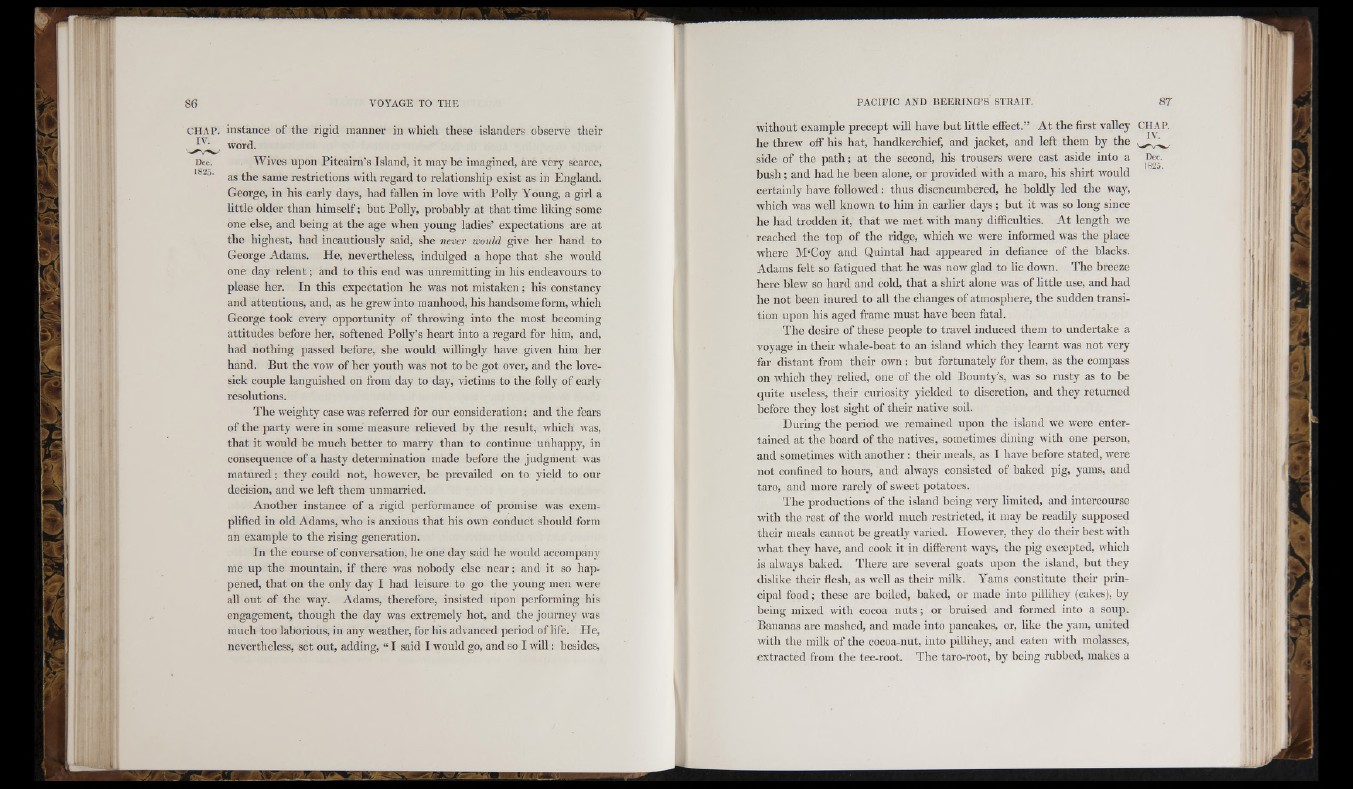
CHAP. instance o f th e rig id man n e r in which th e se islanders observe th e ir
J ) '- word.
Dec.
182-,.
Y’ives upon Pitcairn’s Island, it may be imagined, are very scarce,
as the same restrictions with regard to relationship exist as in England.
George, in his early days, had fallen in love with Polly Young, a girl a
little older than himself; but Polly, probably at that time liking some
one else, and being at the age when young ladies’ expectations are at
the highest, had incautiously said, she naitr would give her hand to
George Adams. He, nevertheless, indulged a hope that she would
one day relent; and to this end was unremitting in his endeavours to
please her. In this expectation he was not mistaken; his constancy
and attentions, and, as he grew into manhood, his handsome form, which
George took every opportunity of throwing into the most becoming
attitudes before her, softened Polly’s heart into a regard for him, and,
had nothing passed before, she would willingly have given him her
hand. But the vow of her youth ivas not to be got over, and the lovesick
couple languished on from day to day, victims to the folly of early
resolutions.
The weighty case was referred for our consideration; and the fears
of the party jvere in some measure relieved by the result, which was,
that it would be ranch better to marry than to continue unhappy, in
consequence of a hasty determination made before the judgment was
matured ; they could not, howevei', be prevailed on to yield to our
decision, and we left them unmarried.
Another instance of a rigid performance of promise was exemplified
in old Adams, who is anxious that his own conduct should form
an example to the rising generation.
In the course of conversation, he one day said he would accompany
me up the mountain, if there was nobody else near; and it so happened,
that on the only day I had leisure to go the young men were
all out of the way. Adams, therefore, insisted npon performing his
engagement, though the day was extremely hot, and the journey was
much too laborious, in any weather, for his advanced period of life. He,
nevertheless, set out, adding, “ I said I would go, and so I will: besides,
without example precept will have but little effect.” At the first vaUey CHAP.
he threw off his hat, handkerchief, and jacket, and left them by the
side of the path; at the second, his trousers were cast aside into a Dec.
bush; and had he been alone, or provided with a maro, his shirt would
certainly have followed: thus disencumbered, he boldly led the way,
which was well known to him in earlier days; hut it was so long since
he had trodden it, that we met with many difficulties. At length we
reached the top of the ridge, which we were informed was the place
where M‘Coy and Quintal had appeared in defiance of the blacks.
Adams felt so fatigued that he was now glad to lie down. The breeze
here blew so hard and cold, that a shirt alone was of little use, and had
he not been inured to all the changes of atmosphere, the sudden transition
upon his aged frame must have been fatal.
The desire of these people to travel induced them to undertake a
voyage in their whale-boat to an island which they learnt was not very
far distant from their own; but fortunately for them, as the compass
on which they relied, one of the old Bounty’s, was so rusty as to be
quite useless, their curiosity yielded to discretion, and they returned
before they lost sight of their native soil.
During the period we remained upon the island we were entertained
at the board of the natives, sometimes dining with one person,
and sometimes with another: their meals, as I have before stated, were
not confined to hours, and always consisted of baked pig, yams, and
taro, and more rarely of sweet potatoes.
The productions of the island being very limited, and intercourse
with the rest of the world much restricted, it may he readily supposed
their meals cannot he greatly varied. However, they do their best with
what they have, and cook it in different ways, the pig excepted, which
is always baked. There are several goats upon the island, but they
dislike their Hesh, as well as their milk. Yams constitute their principal
food; these are boiled, baked, or made into pillihey (cakes), by
being mixed with cocoa nuts; or bruised and formed into a soup.
Bananas are mashed, and made into pancakes, or, like the yam, united
with the milk of the cocoa-nut, into pillihey, and eaten with molasses,
extracted from the tee-root. The taro-root, by being rubbed, makes a
i
4
!■ . '' ' I
’M